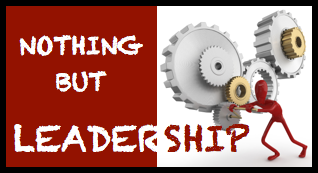What Does It Take to be a Great Leader?

Every Tuesday, we’re sharing valuable and practical leadership tips and tools to help you BE a better leader so you can BECOME a better leader. Remember … you won’t BECOME a better leader until you start BEING a better leader … implementing NOW the changes necessary to adopt the proven strategies of successful leaders. You might start by building on the communication matrix and making sure you’re defending the castle to get done what only you can do. Make sure to take some time so you’re thinking past today. Don’t forget our 12 part Leadership series.
***********************************
We’re human, we make mistakes, we miscalculate …
I continue to examine some of the first 100 newspaper columns I’ve written … and continue to be struck by the timeless issues that we face as we build our businesses.
We’re human, we make mistakes, we don’t always get done what we intend, we miscalculate, things don’t turn out as planned.
Stuff happens.
We know we’re on a journey and not just seeking a destination, but that doesn’t diminish our struggle to overcome many of the same forces that have plagued progress throughout civilization.
(We’ll explore some of those forces, and how to overcome them, in an upcoming column.)
“The importance of knowing accounting can not be underestimated, it’s the language of business. If you don’t know it, it’s like being in a foreign country without knowing the language.” ~ Warren E. Buffett, CEO, Berkshire Hathaway, Inc.
This famous quote from the Sage of Omaha kicked off the 13-part Big River series, a narrative journey examining the value and dangers of accelerated growth and illuminating many of the business finance issues that affect our businesses.
Dilution.
Leverage.
Financing.
Valuation.
Liquidity … and more.
It illustrates the balance that your business requires between the growth that nourishes the organization and the strains it imposes as the body grows. That series is now being published in book form, so stay tuned for that announcement very soon.
“I don’t make jokes. I just watch the government and report the facts.” ~Will Rogers
Few would disagree about the timeless value of this statement. It appeared in a column in November 2008 as the wheels of American commerce were grinding to a halt. I used this “Double V” image to signify the High degree of Volatility and the Low degree of Visibility that branded the horizon, and I’m not sure those characteristics haven’t returned … if they ever left.
At the time, I suggested attacking the nefarious “V” words with a few “F” words of our own to communicate with your teams during hard times.
- Face time by spending more time with your employees.
- Be Forthcoming and tell it to your team as straight as you understand it.
- Use “Facts” not Fiction; your employees can take it and will appreciate knowing that you don’t have all the answers either.
- Frequency reminds us that we can’t over-communicate during these periods. Keep talking; update everyone on what you’re learning as well as what you still don’t know.
As I emphasized then: “Don’t wait to get this done. Your employees are walking on eggshells every day. Pick up the shucks and create a positive environment where employees know the rules and trust that you’ll keep them in the loop at all times.”
“Lewis & Clark didn’t load the canoe with Mojitos!”
I love this tagline from Jim Beam.
It says that we know who we are … and who we’re not … we’re proud of it … and if you don’t like it ….
When we recall the “sustainable competitive advantage” that should earmark our Strategy, it’s critical to stake out “who we are”, a subject we have covered in several previous columns.
Know your core market and “stand for something” is always better than trying to be all things to all people.
Try it sometime.
Your real customers like to hear that you understand the core values they’ve come to respect in your products and services … and you’ll be able to extend your appeal to people who want to buy from someone who knows who they are will make them part of something greater.
We’re got a few tours left through the museum of previous columns before we begin to tackle why these lessons are so hard for us to adopt and put to work.
In the meantime, take stock of these principles.
- Manage growth so it doesn’t consume your resources instead of adding to them.
- Continue to communicate with your employees in this stalled economy so they don’t have to be looking over their shoulder and can focus on what’s important to make the company more successful.
While you’re at it? Make sure everyone knows what you stand for.
********************************
This article was published in the October 31, 2011 edition of the North Bay Business Journal, a publication of the New York Times, and a weekly business newspaper which I have served as a regular columnist for over three years. The Business Journal covers the North Bay area of San Francisco – from the Golden Gate bridge north, including the Wine Country of Sonoma and Napa counties. The electronic version of this article, as published by the North Bay Business Journal, may be found here.
**********************************************************************************
Lary Kirchenbauer is the president of Exkalibur Advisors, providing practical business strategies for family and other privately owned businesses in the middle market. Exkalibur works closely with senior executives and their businesses in the wine and other industries, and hosts the Exkalibur Leadership Forum for leaders of middle market companies in the North Bay. Please visit Exkalibur.com for a library of valuable resources, articles and insights or connect on Twitter, LinkedIN or the Exkalibur fan page on Facebook.



